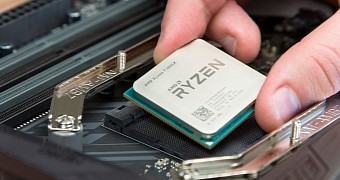A number of users have been complaining about performance issues with AMD’s new Ryzen processors on Windows 10, with thread scheduling said to be the cause due to unknown bugs.
And while at first it seems like Windows 10 and Ryzen chips indeed aren’t getting along very well, AMD explains in a recently-published announcement that there’s absolutely nothing wrong with thread scheduling and everything is “operating properly.”
“We do not presently believe there is an issue with the scheduler adversely utilizing the logical and physical configurations of the architecture,” the company says.
AMD blames an old version of the Sysinternals Coreinfo utility for some wrong data that made the rounds lately, explaining that users need to update to the latest build to get the correct figures.
“As an extension of this investigation, we have also reviewed topology logs generated by the Sysinternals Coreinfo utility. We have determined that an outdated version of the application was responsible for originating the incorrect topology data that has been widely reported in the media. Coreinfo v3.31 (or later) will produce the correct results,” AMD adds.
No difference on Windows 7
The firm also commented on speculation of a performance difference between Windows 7 and Windows 10, pointing out that there’s no issue with scheduling difference between the two operating systems. If there’s any, it’s all because of the software architecture the two Windows versions are using, AMD continues.
Even though at this point there’s no major bug that affects Ryzen on Windows 10 or Windows 7, AMD promises further updates to be released in the future and refine how the processor works on Microsoft’s operating systems.
“We are already finding many small changes that can improve the Ryzen performance in certain applications, and we are optimistic that these will result in beneficial optimizations for current and future applications,” AMD explains.
And last but not least, the company also commented on rumors that simultaneous multi-threading (SMT) could lead to lower performance in some games, explaining that until now, it only sees positive, or in the worst case, neutral results in the majority of games.

 14 DAY TRIAL //
14 DAY TRIAL //